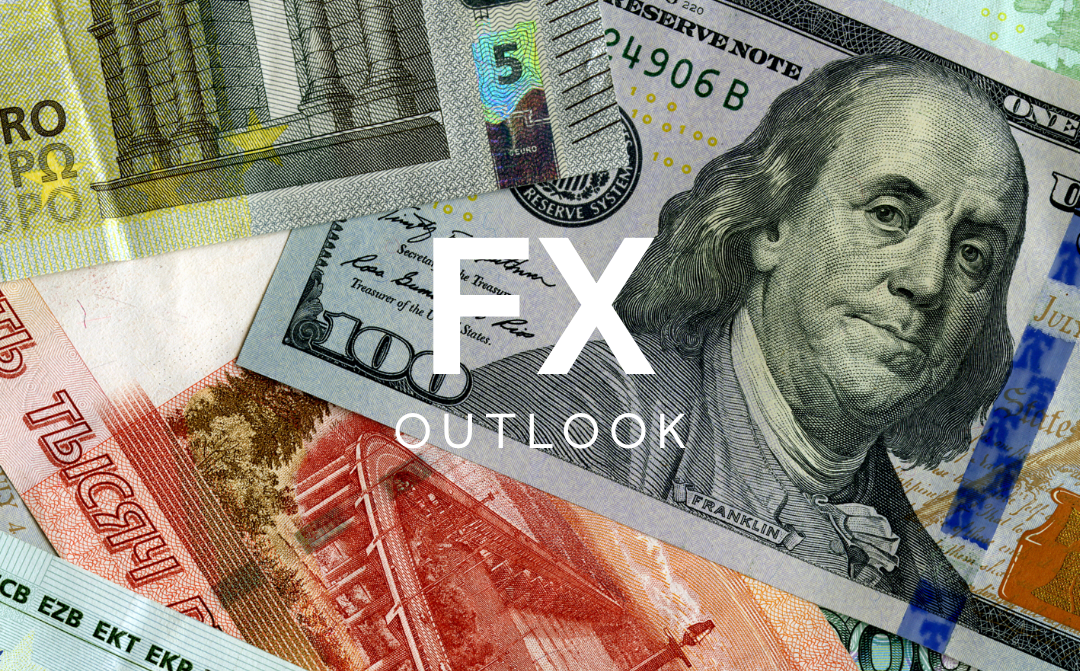8 Jan FX outlook – USD, EUR, GBP, CAD, AUD, NZD

Table of Content
US dollar (USD)
The US dollar has found favour at the beginning of the year, with risk-assets losing traction that’s to growing concerns around the potential pace of monetary tightening this year. Losses in equity markets brought gains for havens such as the dollar, which found itself gaining ground against most currencies over the course of last week. The 1% gain in the dollar index represented the best weekly gain since mid-July.
From an economic perspective, last week saw a major focus on Friday’s jobs report, with the bumper 216k payrolls figure coming in well above estimates. Coming alongside an elevated wage growth figure of 4.1%, this spooked markets on the prospect of a more cautious approach to easing from the Federal Reserve. Nonetheless, the ISM services PMI report released soon after the jobs numbers did allay those fears somewhat, with a sharp decline in this gauge (50.6 from 52.7) overshadowed by the employment element which fell to 43.3. With the jump in non-farm payrolls largely attributed to part-time jobs, clearly not all is well on the jobs front in the US. As a result, markets moved back in favour of a potential March rate cut from the Fed.
Looking ahead, the US inflation outlook represents the main focus, with CPI (Thursday) and PPI (Friday) reported in the latter part of the week. The ability to drive down CPI towards the 2% target by March is a key topic for those hoping for a swift pivot from the Federal Reserve, with a rise in this CPI reading likely to cause market jitters. However, markets are looking for a gradual continuation of the disinflation trend, with the coming months expected to see a move back down below 3%.
Euro (EUR)
The euro experienced a somewhat mixed week just gone, with the swingle currency picking up momentum from Thursday onward. In a week that saw the dollar outperform, it comes as no surprise to have seen EURUSD lose ground. Those declines were replicated for EURGBP, with the pound enjoying a positive week after recent jitters. Nonetheless, the euro performed well elsewhere, with EURAUD, EURNZD, and EURCAD all gaining ground.
The release of inflation data throughout Thursday and Friday brought particular attention for those following the euro, with strong French (3.7%), German (3.7%), and eurozone (2.9%) CPI figures helping to ease calls for a swift return to easing from the ECB. Nonetheless, it is worthwhile noting that the year-on-year gains are largely driven by baswe effects, with the low monthly eurozone figure of 0.2% highlighting that there is a good chance we see a return to the 2% target in the near-future.
This week has kicked off with an underwhelming German factory orders figure of 0.3%, although a jump in German exports for November (3.7%) has helped lift hopes for a rebound in German output. Looking ahead, Tuesday brings German industrial production and eurozone unemployment data, as we seek to gauge whether the ECB will see the state of the economy as cause for a swift return to monetary easing.
British pound (GBP)
The pound enjoyed a bumper week just gone, gaining ground against many of its counterparts has sought to regain some of the ground lost over the course of a difficult December. In a week that saw few economic announcements out of the UK, this rebound felt like a bounce back from a somewhat over extended downside move last month. While the US dollar managed to push higher against pound, sterling enjoyed upside against the likes of the euro, Loonie, Aussie, and Kiwi.
In terms of economic data, the UK focused primarily on PMI data released over the course of last week. The all-important services sector PMI figure brought a welcome upward revision to its December reading, rising to a six-month high of 53.4. Meanwhile, Friday’s construction PMI release saw a four-month high of 46.8, although the sector remains well in contraction territory for now.
This week sees things pick up significantly, with Friday’s GDP release likely to grab the headlines after a difficult October (-0.3%). Further weakness would likely embolden calls for a swift pivot from the Bank of England, although there is hope that we see a move back into posituive territory in November. We also see a host of other data points released alongside that GDP figure, with industrial production, manufacturing production, and trade balance data bringing key insights as we seek to judge whether the economy is sufficiently weak to test the BoE’s patience.
Canadian dollar (CAD)
The Canadian dollar has started to come under pressure as we begin a new week, following what has been a somewhat positive start to 2024. It has been a largely varied time of late though, with the dollar, euro, and pound all gaining ground over the Canadian dollar. Conversely, the Loonie did enjoy some success against the likes of the New Zealand dollar, Australian dollar, and Japanese Yen.
Last week saw an eventful end to the week, with the latest jobs report bringing a concerning 0.1k employment change figure; the lowest in five-months. Thankfully, the unemployment rate remained at 5.8% to ease concerns somewhat. The wide-reaching Ivy PMI report also managed to boost confidence in the Canadian economy, rising to an impressive 56.3 (from 54.7). In terms of energy prices, crude oil gained ground over the second half of the week, although demand concerns remain.
Looking ahead to this week, the calendar looks very quiet for the Canadian economy. Tuesday’s building permits and trade balance data provides the one area of focus, although we are unlikely to see much CAD volatility in response. Keep a close eye out for crude oil prices, with losses seen on Monday bringing fears of potential CAD weakness given the historical relationship between the two assets.
Australian dollar (AUD)
The Australian dollar saw plenty of weakness over there course of the past week, with a dominant risk-off mood permeating throughout financial markets. Given the fact that the Australian economy is particularly sensitive to the economic outlook, it typically weakens as stock markets lose ground. With that in mind, last week’s losses have been in stark contrast to the gains seen throughout much of December.
Last week saw precious little in terms of key economic data out of Australia, with AUD instead influenced by wider risk attitudes. We did see a raft of PMI surveys from China, with the headline manufacturing PMI falling further into contraction territory. However, those fears were tempered by the privately produced Caixin PMI surveys, which saw both manufacturing (50.8) and services (52.9) push higher.
Looking ahead, Wednesday’s Australian CPI report provides the main event of note. The October reading of 4.9% remains well above the 2% level targeted by the RBA. With that in mind, a sharp decline in this headline inflation gauge could see the Australian dollar lose traction. We also see Chinese CPI and PPI data released on Friday, with the ongoing deflation picture serving to highlight the lack of growth in this key Australian trading partner.
New Zealand dollar (NZD)
The New Zealand dollar similarly lost ground against many of its counterparts last week, with risk-off sentiment seen throughout financial markets driving NZD lower. The Kiwi gained ground against the Australian dollar, but that strength failed to replicate against stronger currencies such as the dollar, pound, or euro.
Last week saw little by way of New Zealand data, with the wider risk sentiment instead impacting the trajectory of the Kiwi. The one area of note came in the form of the latest dairy prices, with the 1.2% rise bringing a welcome increase for this key export. Once again, Chinese PMI data proved an area of interest, with the value and volume of New Zealand’s exports directly impacted by Chinese economic strength.
This week brings another relatively quiet calendar, with ANZ commodity prices providing one area of focus on Wednesday. Other than that, there is likely to be a focus on the wider market sentiment as financial markets react to key data such as the US and Australian inflation reports.
Disclaimer: This material is a marketing communication and shall not in any case be construed as an investment advice, investment recommendation or presentation of an investment strategy. The marketing communication is prepared without taking into consideration the individual investors personal circumstances, investment experience or current financial situation. Any information contained therein in regardsto past performance or future forecasts does not constitute a reliable indicator of future performance, as circumstances may change over time. Scope Markets shall not accept any responsibility for any losses of investors due to the use and the content of the abovementioned information. Please note that forex trading and trading in other leveraged products involves a significant level of risk and is not suitable for all investors.







